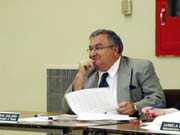When voters head to the polls for the Board of Education election on Tuesday, April 16, not only will they be choosing three board members, but they will also be voting on the new $43.75 million spending plan for the 2002-2003 school year.
At Tuesday’s Board of Education meeting, the board voted to approve the budget. The total amount of spending rose significantly from the present year’s budget of $39 million. The amount to be raised by local taxes rose as well, but because there are more property owners in town paying taxes, the tax rate will stay level at $11.75 per $1,000 of assessed property, according to Superintendent of Schools Patrick Gagliardi.
The total tax levy to be raised by Hoboken taxpayers is $27.4 million, which is a $1.3 million increase over the $26.5 million that was paid by Hoboken residents last year.
Board applies for additional $1.5M in state funding When the superintendent presented the preliminary budget to the board on Tuesday, March 19, there was a $4 million increase in the proposed tax levy. To help fill that gap, last week School Business Administrator Anthony Curko applied for $1,519,554 in additional state aid. That number is the exact amount of revenue needed to avoid a further tax increase.
However, it will take the state approximately nine months to review the application for the new funding, and with the state mired in a deep and well-publicized fiscal crisis, getting those new funds is not a sure thing.
“It’s going to be a fight,” Curko said after the public hearing Tuesday.
If that funding is not approved, the board may be faced with cutting services down the road. But for now, school administrators are content to put forth a budget that doesn’t raise the tax rate.
“It’s a tight budget, but we believe that it provides for a thorough and efficient education,” said Gagliardi after the hearing.
He also pointed out that for the third straight year, the Hoboken school district is expecting an increase in enrollment, as more parents are keeping their children in city schools. “More and more parents are sampling Hoboken’s schools and are happy with what they see,” he said. “The services provided for in this budget will give these parents many good reasons to keep their children in the Hoboken schools.”
The voters will get to vote “yes” or “no” on the budget on April 16. If it goes down, a City Council committee will have to work with the Board of Education on further cuts.
If the budget passes, it will be the ninth consecutive year that there is no increase in the tax rate.
“It’s our mandate to be responsible to the Hoboken taxpayer and maintain a level tax rate,” said Board President David Anthony Tuesday. “And for the ninth year in a row we have been successful in doing that.”
Long time member of the board James Farina praised the superintendent and the administrators who forged the budget.
“I would like to commend [Business Administrator Curko] and Superintendent Gagliardi for their hard work and for creating a budget without a tax increase,” he said. “It will provide for a better and more efficient education for the children of Hoboken.”
Another source of revenue the board has received in the last week was $1.104 million in aid for early childhood education. The Early Childhood Program Aid program establishes procedures to implement and maintain preschool, full-day kindergarten, and other early childhood programs in poor communities.
Largest budgetary increases
By far the biggest increase in the proposed budget goes to “whole school reform” in Hoboken High School. The budget proposes a $5.5 million increase in funding for the reform. The state Supreme Court ordered it in all elementary schools in the 30 poorest New Jersey districts in a landmark 1998 ruling. The state Department of Education later expanded the order up to grade 12.
In the “whole school reform” program, each school chooses an educational model to follow. This sometimes requires the hiring of state-recommended consultants.
Local school administrators, faculty, and parents have worked together to select and enact their whole school reform models.
Also, there will be more money for professional teacher training. Part of whole school reform states that teachers will be required to take part in 100 hours of professional training over the next five years.
Another marked increase is in the funding of the city’s two charter schools. In the budget there is an additional $171,857 allocated for the charter schools.
